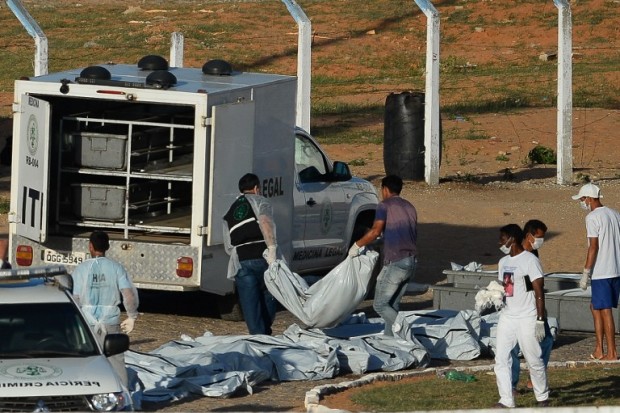
Corpses are being removed from the Alcacuz Penitentiary after a fight between rival gangs left at least 30 prisoners dead on the eve, near Natal, in the Brazilian northeastern state of Rio Grande do Norte, on January 15, 2017.
The latest in a string of brutal prison massacres involving suspected gang members in Brazil is thought to have killed more than 30 people, including some who were beheaded, officials said Sunday. AFP
NATAL, Brazil — The latest in a string of brutal prison massacres involving suspected gang members in Brazil is thought to have killed more than 30 people, including some who were beheaded, officials said Sunday.
The bloodbath erupted Saturday night in the overcrowded Alcacuz prison in the northeastern state of Rio Grande do Norte.
Similar violence at other jails in Brazil left about 100 inmates dead in early January.
“There are probably more than 30 dead” at Alcacuz, police investigator Otacilio de Medeiros told reporters after leaving the facility Sunday.
Security forces stormed the prison at dawn and restored order after 14 hours of violence, local authorities said.
Officials said members of two drug gangs clashed violently after coming out of different parts of the prison.
“There are at least three inmates dead because we were able to see their heads,” state prisons manager Zemilton Silva told local media on Saturday, before the death count rose.
Separately, officials in the southern state of Parana said 28 prisoners escaped from a jail in the city of Curitiba after inmates blew up a wall and fired on police.
Prisoners armed
At Alcacuz, security forces surrounded the prison but had to wait until first light Sunday to storm the site with armored vehicles, officials said.
Prisoners had cut off the electricity and were said to have firearms.
The prison, just outside the state capital Natal, was built for a maximum of 620 inmates but currently houses 1,083, the state justice department said.
Brazilian media said the riot was thought to be a clash between Brazil’s biggest drug gang, the First Capital Command (PCC), and a group allied to its main rival Red Command.
Experts say the violence is part of a war between drug gangs battling for control of one of the world’s most important cocaine markets and trafficking routes.
Drug gang war
Violence in the first week of January left about 100 prisoners dead — many of them active gang members, authorities said.
Many of the victims were beheaded, disemboweled or dismembered, officials said.
The biggest bloodbath, in the northwestern city of Manaus, left about 60 inmates dead. It appeared to be an orchestrated mass killing targeting members of the PCC.
A second bout of violence in Roraima state killed 33.
It was thought to be a backlash by the PCC’s rivals for its violent expansion.
The states of northern Brazil, which border top cocaine producers Bolivia, Colombia and Peru, are battle zones in the drug trade.
Prisons there — and throughout Brazil — are often under the de facto control of drug gangs, whose turf wars on the outside play out among inmates.
Overcrowding
Overcrowding exacerbates the problem, activists say.
Brazil’s inmate population has been swollen by efforts to crack down on the drug trade.
The country’s jails hold 622,000 inmates, mostly young black men, according to a 2014 justice ministry report. It found that 50 percent more capacity was needed.
Brazil has the world’s fourth-largest prison population after the United States, China and Russia, according to the report.
Brazilian President Michel Temer is under pressure over the issue.
After the two riots earlier this month, he announced the federal government would spend $250 million to build new prisons.
Rights activists and experts questioned whether more prisons are the answer.
Brazil needs “medium- and long-term policies to reduce the vulnerability of certain social groups, to prioritize prevention rather than repression,” sociologist Camila Nunes of the Federal University of ABC in Sao Paulo told AFP after the previous prison massacres. CBB

